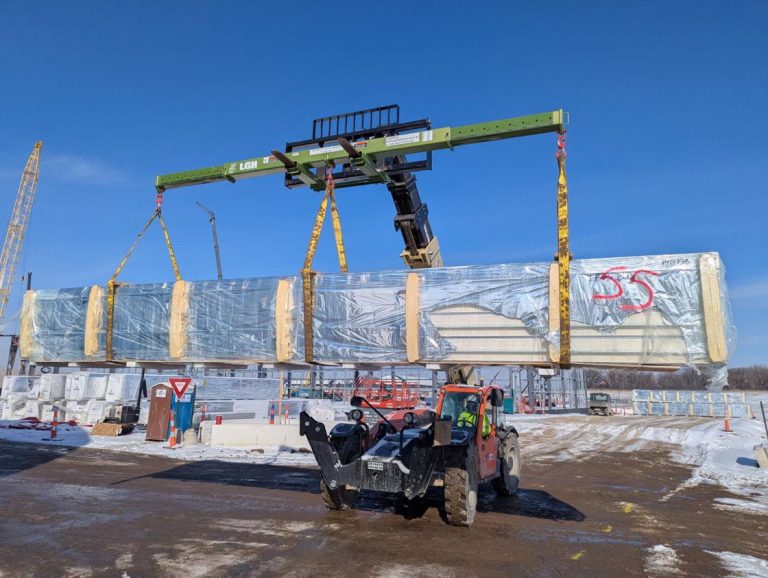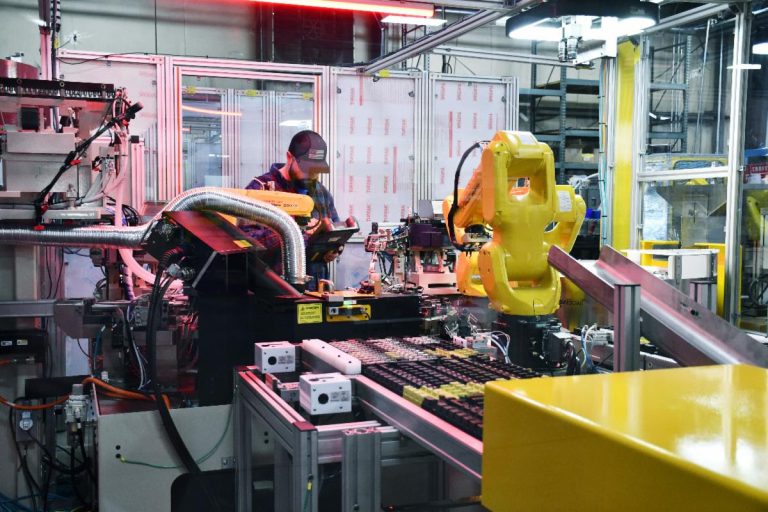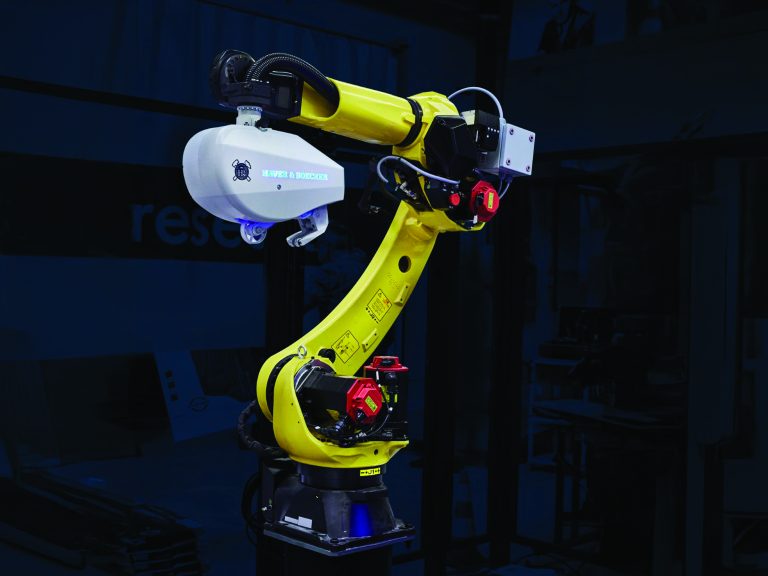Want a lithium-powered model that handles like a yard truck? Want a retrofit lithium battery for any forklift you have? Lithium Battery Solutions brings to market a range of products that will enable you to do just that, Stephen Burton tells HSS editor Simon Duddy.
WHOLLY-OWNED Windsor Materials Handling subsidiary Lithium Battery Solutions has launched a two-pronged approach to bring nuance to the lithium revolution.
Managing director Stephen Burton talks about the concept which aims to transform the market’s mindset when considering their transition to electric, which he believes will make lithium power accessible to new applications, as well as make the retrofit of lithium power to existing forklifts easier and less expensive.
Stephen says: “The typical three-ton electric truck is not a yard truck, they are built for the interior, they have no suspension, the chassis is too stiff, so it will not work for many applications, such as tradesmen for builders, which is what we That’s why the range of forklifts with BSL lithium batteries come into play.”
“Builder’s merchants are absolutely primed for this. Applications tend to be up to 20-25 hours per week, where the user needs the availability.”
For traditional IC truck users, moving to lead-acid battery trucks is arguably a bigger change, as it involves battery maintenance. They must be refilled regularly with distilled water to function properly and stay healthy, which in turn brings added implications to health and safety procedures.
“Typically, switching to lithium is a change of mind for diesel balance users,” Stephen said. “While you can get on a forklift with a BSL lithium battery, the set-up feels very similar—we can tweak the program settings to run like a hydraulic regulator or a traditional torque converter IC truck, which makes the operation The clerk felt like—loved to drive.”
With the BSLBATT Battery, users can get up to 5 hours of runtime on a single charge, but the upcoming 2023 third-generation BSL forklift lithium batteries are expected to run even longer.

SO WHICH USERS WOULD BE MOST SUITED TO THIS TWIST ON THE LITHIUM FORKLIFT?
“Builder’s merchants are absolutely primed for this,” says Stephen. “Applications tend to be up to 20-25 hours per week, where the user needs the availability. For a lot of the independent builder’s merchants, it’s all about quick delivery, they’ve got to keep their customer service levels going and this truck enables them to do that.
“Our advice is, if it’s idle, charge it, you can get a 10% charge in 20 minutes, and a full charge in two hours. You’re getting the opportunity charging with maintenance-free batteries. We describe it as hassle-free motoring.”
Stephen explains: “The BSLBATT range of batteries that we are bringing to market is proving to be a game changer for our customers. We can fit lithium batteries to any manufacturer’s truck, which could be anything from a walk-behind powered pallet truck to VNA man-up machines, providing unchallenged run times.
There are two types of battery on offer: a water-based cell, which is suitable for cold stores; as well as an oil-based cell. The chemistry used is Lithium Iron Phosphate – known as LiFePO 4. – rather than NMC.
“We work closely with the factory to design and build our own batteries to fit inside the trucks and do all the aftermarket modifications to suit any solution. Currently, we don’t work with the CANbus on the trucks, it’s all done via our separate BMS, so we can monitor remotely and keep abreast of utilization,” says Stephen.
“A lead-acid battery has 1,500 cycles, and if you discharge by 20%, that is considered a cycle. With lithium, if you discharge by 20%, you still have 80% usage without impacting performance. You’re getting double in terms of battery lifetime, and despite people sometimes worrying about how to dispose of the batteries once they are no longer fit for use, we’re aligned to a secondary market in uninterruptible supply systems (UPS).”
“Within the market, there is an undoubtable belief that lithium is a dangerous, flammable product with dangerously high voltage which is a challenge we have come across when pitching recommendations to customers” adds Stephen.
“We’re going through an education process to demonstrate that LiFePo4 is in fact, incredibly stable and has been through rigorous lab tests before entering the market. We have test data on all of our cells, including crush and nail tests, and have consulted with the fire brigade on the treatment of a lithium battery fire which transpires is the same as for a lead-acid battery fire.”
That all said, there is still room for traditional lead acid in some applications.
“I still struggle to see why in 24/7 applications reach trucks should be lithium-powered,” explains Stephen. “They hot shift, back-to-back, and I don’t believe there are many companies that have the time to opportunity charge them.
“This last 12 months particularly has shown that the drive in becoming Net Zero by 2030 is not going away.”
“One common mistake that we have identified is that when many people are considering the change to lithium that it has to be either/or, we find we say to customers, this part of your fleet is suited to lead-acid, and for this part, lithium will pay off. This is where the consultancy approach comes in where we will run the operational calculations and work with customers to get the most efficient and cost-effective solution for them.”
Windsor Material Handling is a customer of Lithium Battery Solutions and a distributor for both product types, with Stephen also looking to go out to a select dealer network.
“We are approaching this part of the offering with great consideration, what we don’t want to do is flood the market and find ourselves in a situation with multiple dealers quoting customers on the same product which is frustrating for all parties,” he says.
THE FUTURE OF LIB
While the adoption of lithium-ion technology is growing, it still represents a rather small percentage of the material handling industry. Experts expect that to change over the next five years.
“There’s a misconception that in five years, someone can just create a battery that lasts twice as long as the battery previously,” says Navitas’ ElShafei. “Technology takes a long time to develop. With LiB, the technology is here now, and what’s going to happen in the next five years is the availability, the scale, and the distribution of the product will all increase and improve.”
Electrovaya’s Dang expects the price of lithium-ion technology to continue to drop as scale increases.
“It’s not a matter of if, it’s a matter of when and how much penetration this can get into other markets,” says Dang. “It’ll be a good thing for the entire space in general because costs will come down, and manufacturers will find more innovative ways to manufacture lithium cells at a higher scale and a lower price. The same is true when it comes to mining the minerals needed to make lithium cells. It’s human nature for us to discover and optimize. The price we’re offering material handling customers today has significantly dropped since 2017.”
Battery manufacturers are thinking far beyond traditional forklifts when it comes to the future of LiBs. Automated Guided Vehicles (AGVs), Ground Support vehicles, public transit buses, and delivery vehicles are just a few areas where experts say LiB technology could be adopted.
“Material handling is the number one space that makes sense, but any vehicle that is actively used for more than 10 hours a day could benefit from lithium,” says Electrovaya’s Dr. Dang. “And in terms of R&D, lithium-ion cells will continue to increase in capacity, so it will be possible to power vehicles like delivery vans and buses safely.”
“The future of lithium is really big,” says BSLBATT’s Haley. “There’s great momentum now that all of these industries are getting more and more involved.”
Added BSLBATT’ Haley “We’re all investing heavily in this market space to be part of the incremental market share conversion from lead to lithium, and from IC to electric. Lithium offers the performance of propane with the benefits of electric – what customer doesn’t want that?”











